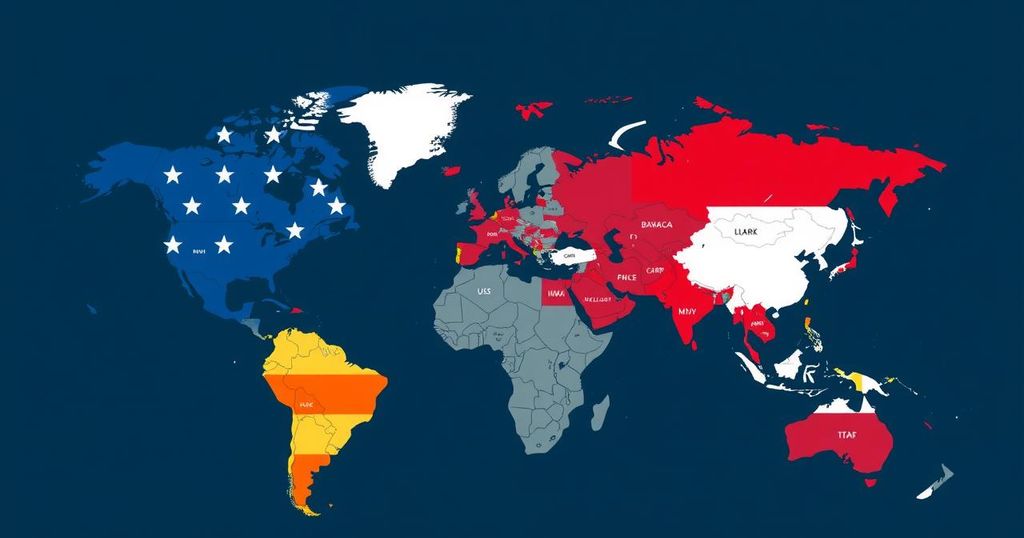The Consequences of the U.S. Election on Global Stability: A Critical Analysis of Foreign Policy Prospects
The article argues that the potential reelection of Donald Trump poses a significant risk to global stability and foreign relations. It discusses the concerns of international leaders and America’s allies regarding Trump’s history of exacerbating tensions with adversaries, fostering an isolationist stance, and undermining alliances. In contrast, it presents Vice President Harris as a candidate who could provide consistency and stability in foreign policy, arguing that the world cannot afford another Trump administration.
The 2024 United States electoral outcome could have far-reaching implications for global stability and foreign relations. Prominent European Union official Josep Borrell recently asserted the need for Europe to brace for potential conflict, citing uncertainty regarding American support contingent upon the upcoming election results: “Maybe, depending on who is ruling in Washington, we cannot rely on the American support and on the American capacity to protect us.” This sentiment echoes through the concerns of America’s allies, who are apprehensive about renewed tension under a possible second Trump presidency. Former President Donald Trump has previously suggested that he would advocate for Russian aggression toward NATO allies that do not meet defense spending commitments. European nations, Japan, and South Korea are adjusting their defense strategies in response to a shifting global landscape, with calls for increased military spending and independent deterrents growing louder. Trump’s record reveals a history of undermining traditional alliances. His inappropriate interactions with North Korea have accelerated its nuclear ambitions and fostered closer ties between North Korea, China, and Russia. In contrast to Trump’s proposed isolationist strategies, the Biden administration has pursued a more measured foreign policy that addresses global trade concerns while maintaining pressure on adversaries. The Middle East remains a volatile issue. Vice President Kamala Harris has shown support for Palestinians and critical views towards Israel, although continuity in arms shipments persists. Meanwhile, Trump’s past actions concerning the Iranian nuclear agreement raised alarms regarding regional stability; though he exhibited restraint against military engagement with Iran, it remains uncertain how he would approach such negotiations again. In terms of foreign policy stability and consistency, it appears that Vice President Harris, despite some reservations, would prioritize balanced engagements over Trump’s erratic tendencies. While Senator Harris may advocate for diplomatic negotiations with Russia regarding Ukraine, it is vital to recognize her potential inclination toward continuity in policy. Trump’s approach has consistently undermined diplomatic norms and fostered a more chaotic international environment, which has repercussions beyond American borders. Under Trump’s administration, his rhetoric has legitimized extremist ideologies and exacerbated social tensions domestically. In contrast, while Harris may not achieve perfection in her foreign policy strategies, her leadership would prioritize stability, responsible governance, and a re-engagement with established international agreements, particularly concerning climate action—addressing essential global challenges rather than dismantling collaborative agreements, as Trump has been known to do. In conclusion, the prospect of a second Trump administration threatens to destabilize not only American foreign policy but also international relations as a whole. The developed world cannot afford the repercussions of reverting to Trump’s divisive and hazardous approach. Hence, the forthcoming election carries immense stakes for both America and its global allies, underscoring the imperative for capable leadership committed to constructive diplomacy.
The article discusses the potential ramifications of the upcoming U.S. election on international relations and foreign policy, particularly concerning the prospect of Donald Trump returning to office. It highlights the unease experienced by NATO allies and other nations, suggesting that Trump’s previous actions had previously destabilized global diplomatic norms and strengthened autocratic regimes. In contrast, it outlines a potential shift toward steadiness and collaboration under the leadership of Vice President Kamala Harris, who represents continuity and responsible governance in foreign affairs.
The article emphasizes that the upcoming U.S. election is critical not only for the nation but also for the entire world. A return of Donald Trump to the presidency could lead to increased global instability, a breakdown of alliances, and a regression in critical global issues such as climate action. In contrast, Vice President Harris’s leadership, while not without its faults, is likely to foster a more stable and responsible approach to foreign policy. Thus, it is crucial for voters to consider the broader implications of their choices at the ballot box.
Original Source: www.theguardian.com




Post Comment